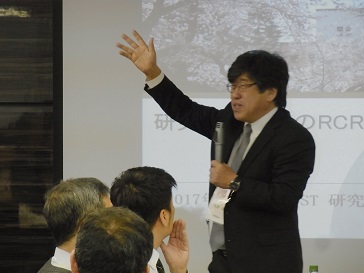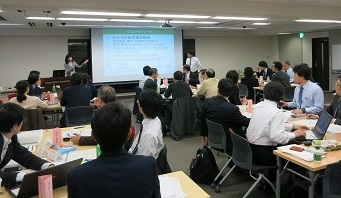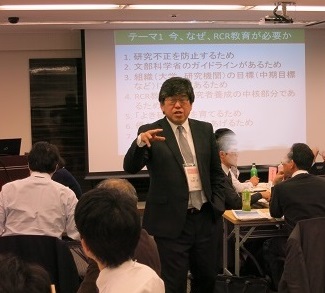Event Reports
JST Workshop on Promoting Activities toward Research Integrity - Education in the Research Field - (8 Mar '17, 14 Mar '17)
JST Workshop on Promoting Activities toward Research Integrity - Education in the Research Field - (8 Mar, 14 Mar '17) The JST Workshop on Promoting Activities toward Research Integrity was held in Tokyo (8 March, 2017) and Osaka (14 March, 2017). This workshop, sponsored by the Japan Science and Technology Agency (JST), is a program in which participants experience methods for promoting fair research activities developed in the United States, and think about how to proceed with guidance at the research site through discussions and work. In both venues, the participants were divided into groups and actively worked on issues through discussions and group presentations on the significance and methods of education. In the workshop, various opinions were exchanged, and information was shared through group work and other activities.
We report on the content of the Tokyo and Osaka venues.
Current status and issues of research ethics education: Beyond mere prevention of research misconduct
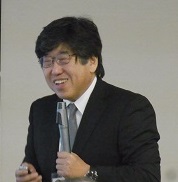
Participants in the workshop belonged to universities, private companies, public research institutes, and other organizations, and were specialized in a wide range of fields such as medical, engineering, humanities, and social sciences. There were also participants such as members from the secretariat of research support. In the workshop, students were divided into groups of 4 to 6 people and worked on issues. The Tokyo venue consisted of seven groups and the Osaka venue consisted of six groups. When organizing a group, members from similar fields of expertise were gathered as much as possible to make it easier to discuss issues specific to the fields.
The workshop started with a lecture by Prof. Fudano of Tokyo Institute of Technology. Prof. Fudano showed that there were two types of research ethics, i.e., "preventive ethics," which was based on compliance with laws and regulations, and "aspirational ethics," which aimed to contribute to society. He proposed a shift from research ethics education, which had been conducted for the purpose of preventing research misconduct, to RCR education aimed at responsible conduct of research. He also explained that the U.S. National Institutes of Health (NIH) positioned RCR education as a core part of the training of researchers and pointed out that not only e-learning but also discussions with dialogues were essential as education methods. Prof. Fudano also outlined the current situation in Japan where efforts were being made at various research institutes in accordance with the guidelines of the Ministry of Education, Culture, Sports, Science and Technology (MEXT), including the accumulation of good cases. As a particularly notable case, he introduced Tohoku University's efforts to systematize RCR education according to the career stage (undergraduate and graduate students, and newly appointed faculty members, etc.) and other efforts.
Although RCR education is progressing in Japan, Prof. Fudano pointed out that there were several issues, including "fostering ethical judgment and problem-solving abilities" and "fostering attitudes and dignity of professionals." He explained that it was difficult to sufficiently develop these abilities through lectures and e-learning alone, and that education using the case method was effective. However, he pointed out that there were various issues at this stage, such as lack of appropriate teaching materials, common understanding of educational goals and learning content for RCR education within each institution/organization, and differences in teaching content among faculty members in charge of classes.
Furthermore, he mentioned that in some institutions and organizations, the person in charge of RCR education was also the person in charge of research fund misconduct and expressed concern that when a person in charge of compliance with laws and regulations concurrently served as the person in charge of RCR education, the content of education tended to be supervised and preventive ethics.
A program to gain an understanding of RCR education from PIs (principal investigators)
After the lecture, an icebreaker was held, and the atmosphere was relaxed through self-introductions, and Prof. Fudano gave a speech to the participants about his hopes for contributing to the spread and development of RCR education in Japan in the future, and then explained the theme of the workshop and how to proceed with it.
The workshop program was created by a research group at the University of California San Diego with a research grant from the U.S. National Science Foundation (NSF) and is open to researchers in a leadership position such as PIs. However, this program does not focus on PIs, but rather presents various ideas for research ethics education to PIs and has them conduct RCR education for postdoctoral fellows and students in their own laboratories. In other words, it is an excellent feature that is easy to introduce into a research site, such as having each PI think about the content suitable for each research environment, taking care not to impose from top. Prof. Fudano then presented the following six learning goals for the workshop that day.
1. Can understand and persuasively explain the need for RCR education.
2. Can explain why RCR education is provided in research sites.
3. Can design a draft research ethics program (suitable for the research environment).
4. Can describe the goals (educational goals) and content of RCR education.
5. Can understand tools for RCR education and devise specific application methods.
6. Understand the need to measure and evaluate the effectiveness of RCR education.
Persuasively explain the workshop issue, "Why RCR education is necessary"
The first issue of the workshop was to discuss and present three points in each group to persuasively explain "why RCR education is necessary now." 15 minutes were provided for discussion. In each group, enthusiastic discussions were held, adducing reasons such as prevention of research misconduct and the provision of the guidelines stipulated by the MEXT. Group presentations were made, in the hypothetical situation of persuading a stubborn PI who was not interested in RCR education, and the representative of each group explained the necessity of RCR education toward the person who played the role of the "scary PI."
The groups adduced the following reasons:
"To comply with the guidelines of the MEXT" as one of candid reasons,
"Make tacit knowledge explicit (make it explicit knowledge) in order to foster good researchers and good medical personnel,"
"For trust in science," "Accountability to society,"
"Necessary to accumulate data correctly in order to return research results to society," and
"Try not cause inconvenience to future patients and other users by misconduct prevention."
In addition,
"Because it is in the organization's mid-term goals,"
"In addition to the repayment of expenses, if misconduct occurs, it will cost a lot of money, including labor costs to process it, and due to a decline in social reputation, it will not be possible to obtain good human resources," and so on
were indicated as reasons from the governance and organizational defense perspectives.
Moreover,
"Different research fields have different research manners and different definitions of research misconduct. As rules change, we need an opportunity to be aware of the current situation through RCR education," and
"The research field is considered unsound due to research misconduct, and young researchers will not gather," were adduced as the reasons.
Furthermore,
"If a subordinate commit misconduct inadvertently due to not knowing the rules, the teacher will be affected. Let's think together to protect teachers themselves, even if more labor is needed," were said, taking an approach provoking sympathy.
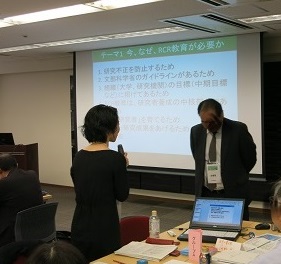
the role of the PI (Osaka venue)
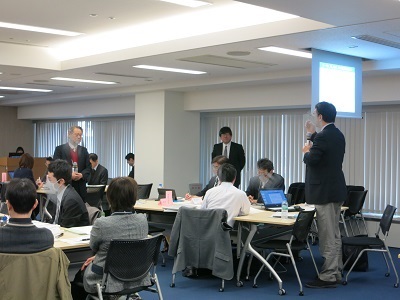
the role of the PI (Tokyo venue)
In response, the person who played the role of the PI asked essential questions such as "What is the definition of 'good' of a good researcher?" and commented, "It is very difficult to persuade the PI who wants to minimize his/her involvement in RCR education, and generalities are not useful to persuade the PI," and so on. The participants recognized once again the difficulty of sharing the idea that RCR education is an obligation as a researcher.
Workshop issues, "What is the purpose of RCR education?" and "What items should be included in RCR education?"
The next issues of the workshop are "What is the purpose of RCR education?" and "What items should be included in RCR education?" Regarding the purposes (goals) and content of RCR education, materials from NIH, CITI Japan, and the " For the Sound Development of Science -The Attitude of a Conscientious Scientist" of the Japan Society for the Promotion of Science were presented. Based on those, each group of the participants held discussions for 20 minutes to present three educational purposes (goals) and three educational items (contents).
The purposes (goals) of RCR education presented by each group are:
"Social contribution through the return of research results to society,"
"Development of the ability to identify and solve ethical issues,"
"Knowing of the rules of fair research activities and being able to think about the background,"
"Fostering of researchers who conduct responsible research activities," and so on.
In addition,
"Acquire general knowledge as a member of society (for undergraduate students),"
"Acquire the decencies that should be observed for research activities (for graduate students),"
"Acquire leadership skills for students and postdoctoral fellows (for PIs)" were presented by some groups that set purposes according to the career stages.
Moreover, items that should be included in RCR education as presented by the groups of the participants are:
"Communication with society,"
"Understanding of research risks (protection of subjects, prevention of health hazards, etc.),"
"Learning of not only from major cases but also from near-miss cases when learning from past cases of misconduct," and so on.
As other items,
"Moral education as a member of society (for undergraduate students),"
"The decencies that should be observed for research activities (data storage, lab notebooks, etc.) (for graduate students),"
"Leadership skills necessary as a laboratory team leader (for PIs)" were presented as educational items according to the level.
Furthermore,
"Protecting researchers and students by presenting criteria for judging research misconduct as an organization and by eliminating disparities in judgments due to differences in the values of each PI" was also presented by one of the groups.
After the presentations by each group were made, Prof. Fudano explained that when conducting RCR education, not only the acquisition of the decencies that should be observed for research activities, but also the aim of the goals, e.g., fostering ethical judgment and problem-solving abilities and developing professional dignity and attitudes, were required, and in order to achieve those, it is important to first try to conduct RCR education more than anything.
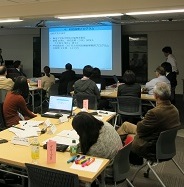
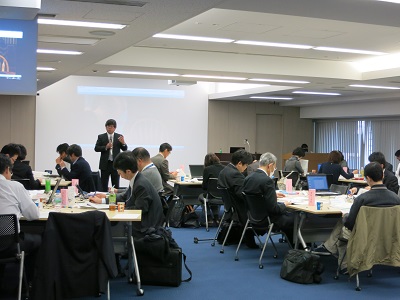
A seven-step guide for considering the reasons for conducting RCR education in research sites and cases
Next, Prof. Fudano explained the "method for RCR education," "reasons for conducting RCR education in research sites," "research ethics programs," and "how to use tools for RCR education".
Various methods for RCR education were introduced, such as lectures, e-learning, hybrids combining both, and workshops. Among them, Prof. Fudano explained "Ethics across the curriculum," combining "Micro-insertion," which adds elements of RCR education to each subject, rather than setting specific subjects for RCR education, with those subjects to work on them as the whole curriculum and presented concrete methods such as learning about authorship when preparing group reports for experimental subjects as those examples.
In addition, he enumerated five reasons for RCR education in research sites, i.e., "learning from actual examples," "learning by practice," "learning in situations," "learning what the most important thing is," and "learning continuously." He added that daily research enabled researchers to know what the laboratory considered the most important and also the advantage of regularly working on it, unlike attending a one-time seminar or lecture.
In addition, he emphasized that the commitment of top management is extremely critical when developing a research ethics program and that a mission statement needs to be created. He also said that when creating a mission statement, it is important for universities to always include their educational mission and to be aware that they are an institution that educates people. Moreover, he explained that when creating a mission statement for each laboratory, thinking specifically about how researchers' research related to society and what values they considered important enabled them to create a value-shared mission statement.
He also explained the Seven-Step Guide, which is an effective tool for incorporating the creation of a research ethics program into student education. The Seven-Step Guide is designed to make intuitive judgments and then to proceed with step-by-step considerations on the cases presented. The facts are organized, action plans are derived from stakeholders and their values, and the action plans are evaluated multidirectionally through multiple tests. After making a decision, recurrence prevention measures are examined lastly, constituting a seven-step structure all together. He explained that letting students create cases using this Seven-Step Guide enabled them to acquire a high education effect. In addition, although cases using the case method often deal with misconduct cases, it was proposed to create good cases modeled on Nobel Prize winners, etc. and to conduct RCR education using these good cases.
Additionally, the case of Kanazawa Institute of Technology was introduced as an example of the class, as a required subject, which uses the seven-step guide to encourage students to think about the RCR education program of their own laboratory.
In addition to the case method as the use method of the instructional video "THE LAB" (click here for details), the idea was also presented, which using scenes depicting the daily lives of researchers as subjects enabled viewers to get an opportunity to discuss topics that were difficult to discuss on a daily basis, such as "What is important for researchers?"
Moreover, various tools and their usage were explained, such as the use of "individuals' ability development plans" and a "checklist for students and advisors conducting research," which stipulated how to proceed with research guidance between students and PIs.
Then, Prof. Fudano said that what was important in RCR education was not to restrict researchers pursuant to laws and regulations, but to prevent creative research activities from being hindered and to direct individual researchers to make their own decisions and take their own actions through intrinsic motivation.
Workshop issue, "A method for RCR education that is considered the most effective at present"
After an outline of the method for RCR education and the tools were given, each group discussed a "method for RCR education that is considered the most effective at present" and tackled issues requiring to present three suggestions. 15 minutes were provided for discussion. Groups lively discussed considering effective methods based on their realistic hard-working experiences gained at their institutions. This issue was only discussed at the Tokyo venue.
During the presentation, each group presented the following opinions on how to prepare an environment for RCR education in addition to proposing education methods:
"We don't know how to prepare for education and how to prepare teaching materials that fit each research site,"
"We wonder how we deal with PIs that do not attend training sessions,"
"We need educational content that is satisfactory and useful to each researcher,"
"Both those who prepare teaching materials, etc. and those who receive lectures have a heavy burden, but the things that they can obtain are small," and so on
were shared as worrisome problems for those responsible for the planning and operating RCR education at each institution. One of the advantages of cross-institution workshops is that participants can talk openly about these issues.
In relation to these issues, the group presentations presented the following ideas:
"In order to reduce the burden on researchers, conduct pretesting on them and carefully select the education content required for each individual,"
"Provide opportunities for students in the lab to conduct discussions and have PIs participate in them,"
"Create a compulsory system in which students cannot apply for research without attending lectures,"
"Conduct RCR education for each academic society rather than for each university because there are large differences between fields," and so on.
Based on these opinions, Prof. Fudano commented that RCR education for each academic society is effective because rules and ways of thinking differ depending on each research field, and presented the view that since a laboratory could be said to be a small academic society, each laboratory could be an effective place for RCR education.
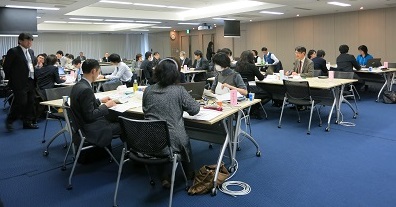
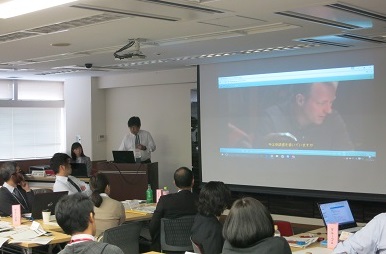
Workshop issues, "Creating a laboratory code of ethics" and "Which tools to use for RCR education"
The final issue of the workshop for each group was to create a code of ethics for a specific laboratory and discuss and present which tools to use to conduct RCR education. When it came to RCR education, it was required to consider details (who, when, where, what, for what, and how) as specifically as possible. For group work and presentations, the code of ethics stipulates at least three items specific to the intended laboratory, and at least two tools for RCR education shall be used. Instruction was given to take into account the mission statement of the laboratory and the assessment of potential risks to work on RCR education. The discussion time was about one hour, and each group engaged enthusiastically.
The code of ethics presented by each group included:
"Conduct research that is useful to society," "Contribute to society and respond to the trust of society,"
"Be a good researcher,"
"Make decisions autonomously,"
"Contribute to sustainable development,"
and additionally,
"Clearly map the members of all laboratories to each research project,"
"Always communicate with an open mind,"
"Work on transparent laboratory operation and foster an open laboratory culture,"
"Achieve a research environment that takes work-life balance into consideration," and so on, which were specifically set forth regarding the operation of the laboratories.
In addition,
"Respect human rights,"
"Be safe, healthy and environmentally conscious completely,"
"Fully explain risks to research collaborators and obtain their consent," and so on, were presented by some groups on how to proceed with the research.
The laboratories that each group envisions were set up in a very concrete manner, including personnel organization and external funding, e.g., "laboratories that conduct multiple joint research with multiple companies" and "laboratories that consist of research groups consisting of multiple PIs in a unit system." After considering possible risks, they formulated the code of ethics, and the contents of their presentations conveyed the seriousness of their group work efforts.
Research risks include:
"Research for research with the aim of acquiring research funds,"
"Self-judged deviation from the protocol,"
"It is difficult to share information within the laboratory due to the vertical division by a multiple-group organization in a unit system,"
"Safety problems such as poisonous and deleterious substances (chemical laboratories),"
"Accidents during work," and so on, which were concrete content.
As an educational tool for RCR education in laboratories, multiple tools such as "cases," "THE LAB," and "individuals' ability development plans" were planned in combination. There were also presentations on the timing to conduct RCR education and the hierarchical plan for each target researcher. In addition, educational methods such as e-learning, lectures, and workshops were planned according to the timing and target researcher as creative ideas.
For example,
"Conduct compulsory e-learning upon arrival of all researchers,"
"Hold laboratory leader training sessions every two years, and examine 'THE LAB' in a seven-step guide,"
"Hold a workshop for cross-laboratory training referring to 'cases' once a year,"
"Use individuals' ability development plans in each research unit, and also unify management standards between the units by the supervising PI checking them,"
"Learn basic knowledge in the Green Book when assigned to a laboratory, and learn the specific requirements of each project when participating in a joint research project,"
"Use a part of the time of the laboratory meeting to set a theme such as personal information protection and discuss it regularly," and so on were specifically presented.
Moreover,
"Conduct RCR education using a 'checklist' and mutual inspection of the checklist with other laboratories" was presented by some groups proposing the provision of opportunities to interact with other researchers for open laboratory operation.
Prof. Fudano praised each presentation for presenting many ideas in a short period of time and encouraged each participant to think about RCR education together with their other members of respective research sites after returning there. He expressed his expectation that more excellent ideas would be generated.
He also pointed out that the assumed risks shown by each group were different in each laboratory, so if RCR education was conducted with the content common to each field, it would become general content. He said that there was concern that this would lead to the emasculation of RCR education.
Moreover, he emphasized that when developing a laboratory's code of ethics, it was always necessary to include items about the values that they cherished and their relationship with society so that they would not become rules.
Next, he explained about the measurement and evaluation of the effectiveness of RCR education, and that in addition to measuring the effectiveness on individuals, it was also necessary to measure the effectiveness of organizations that evaluated how the organization had changed due to RCR education. He also explained that while it was possible to measure knowledge in tests that had already been developed, measurement methods such as problem finding and solving abilities, and attitudes had not yet been developed at present.
He also introduced a questionnaire created in the United States for measuring the effectiveness of organizational units such as faculties and departments and expressed the view that further examination of the content was necessary for applying it to Japan.
At the end of the workshop, the participants were asked to cooperate in promoting fair research activities in the future, and the workshop filled with enthusiasm throughout the day ended.
After the workshop, the participants gave the following opinions:
"I was able to get information on new various educational tools,"
"I deepened my understanding of the design of research ethics education programs and the image of practicing them,"
"Lectures and discussions have clarified the need for ethics education, which was previously vague,"
"I was able to have discussions with a variety of participants from different fields, which gave me a new perspective,"
"We were able to discuss and share information about the initiatives and issues of other institutions among those engaged in research ethics education," and so on. Additionally,
"The question is how to bring today's achievements back to the organization and spread them,"
"I have a lot of constraints in my institution, and it is difficult to get enough time."
"Because of the broad coverage of misconduct, the research ethics problems were not deepened,"
"The time is short for the volume of the content, so it is better to focus on the theme," and more were presented, leading to future improvement of the program.
